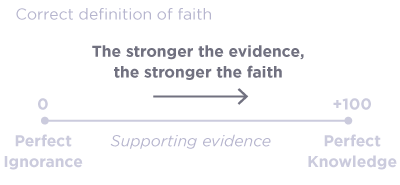In the 1990s cartoon show Animaniacs, there was a carefree toddler character named Mindy. She would often annoy other characters by repeatedly asking "Why?" until the characters became flustered and gave up trying to answer. She was annoying because she wasn't asking "why?" to gain understanding, but because she enjoyed pushing people's buttons. Unlike Mindy, genuinely curious people ask "why?" to arrive at an explanation. To explain something is to show why certain effects follow from certain causes. If we ask why enough, we will eventually arrive at an explanation that does not have any explanation itself. It seems all explanations bottom out in some cause that itself did not have a cause. Some have referred to this final explanation as the uncaused causer. "Who or what is the uncaused causer?" is the same question as "Where do all explanations end?" Atheism gives one answer, Traditional theism gives another. Mormonism seems to give an answer that is a hybrid of both atheism and traditional theism.
Volitional vs. Non-volitional explanations
There are two ways to answer the question, "Where do explanations end?" Traditional theists such as Christians, Jews, and Muslims believe that all explanations end in a volitional explanation. I am using the word "volition" to refer to that which is caused by some being or agent.
Atheists, on the other hand, believe in a non-volitional explanation. Explanations end in something like the laws of physics, or nature in general, (or even just gravity according to Stephen Hawking). Some atheists say that they simply don't know how to explain existence in general, but still hold that no volitional being could be the uncaused cause of the universe.
For example, if we ask the question "why is the sky blue?". We will come to some explanation that describes the behavior of lightwaves when they interact with particles in the atmosphere. After we come to that explanation we can ask, "Why do lightwaves behave that way?" Describing the laws of quantum electrodynamics might constitute an explanation for that question, but then we could just ask, "why are the laws of quantum electrodynamics like that?" An atheist will answer that nature is just that way and that is where explanations end. A traditional theist would answer that God created the laws that way and that is where explanations end.
Where do explanations end for Mormon theology?
According to Mormon theology, some explanations end in non-volitional causes and some explanations end in volitional causes. How can this be? Mormon theology agrees with both Aristotle and Plato who argued that the world always existed and that God organized the world out of pre-existing unorganized matter. That pre-existing matter was not created out of nothing. It has no cause. It has always existed and therefore has no explanation. On this point, Mormon theology agrees with the belief of most atheists.
The first prophet of The Church of Jesus Christ of Latter-day Saints, Joseph Smith, taught that God did not and in fact could not create the universe:
God had materials to organize the world out of chaos—chaotic matter, which is element, and in which dwells all the glory. Element had an existence from the time He had. The pure principles of element are principles which can never be destroyed; they may be organized and re-organized, but not destroyed. They had no beginning and can have no end. (King Follett Discourse)
According to the LDS scholar Sterling McMurrin who wrote Theological Foundations of the Mormon Religion:
“It is a basic article of Mormon theology that God is related to a world environment for the being of which he is not the ultimate ground and by which he therefore is in some sense conditioned. This means that God is a being among beings rather than being as such or the ground of being, and that he is therefore finite rather than absolute.” (Theological Foundations of the Mormon Religion)
Orson Pratt who was an early Mormon church leader wrote:
“God [in LDS thought] is described in non-absolutistic terms as a being who is conditioned by and related to the world of which he is a part and which, because it is not ultimately his creation, is not absolutely under his dominion … God’s environment is the physical universe, the minds and selves which exist but are not identified with him, the principles under which reality is structured, and perhaps even the value absolutes which govern the divine will,”
“There are some things that cannot be performed, although we had the power of working great and mighty miracles; indeed, the great God Himself who has power to control the heavens over our heads, and the earth upon which we stand has NOT the power to do that which would be naturally impossible, or in opposition to the great, necessary, and fundamental truths of nature, which are eternally unalterable, and cannot be otherwise than they are,” (JD 3:300).
There are many other quotes that confirm the Mormon belief that these explanations do not end in God, but instead end in the elements and principles of nature. No volitional being did or could have created them.
However, according to most accounts of Mormon theology, volitional beings (spirits or intelligences) also were not created. All volitional beings are coeternal with the elements that have always existed. According to Joseph Smith:
I might with boldness proclaim from the house-tops that God never had the power to create the spirit of man at all. God himself could not create himself. Intelligence is eternal and exists upon a self-existent principle. It is a spirit from age to age, and there is no creation about it. All the minds and spirits that God ever sent into the world are susceptible of enlargement. (King Follett Discourse)
If volitional beings are also uncreated, then their actions cannot themselves be reduced to non-volitional causes. Volition is simply part of uncreated nature. Therefore, some explanations end in the choices of volitional beings. For example, when we ask why a painting of the sky is blue, it is not satisfactory to appeal to the laws of quantum electrodynamics. Any explanation for why a painting is blue must account for the intentions of the painter who organized the paints on the canvas. The painting is blue because of the laws of nature AND because of the intentions of the painter. In Mormon theology, the answer to the question "where did matter come from?" ends in a non-volitional explanation. And, the answer to the question "why was matter organized in a certain way" can end in a volitional explanation. Concerning the latter question, God organized the pre-existing matter that we experience on this earth to fulfill His eternal purposes. On this point, Mormon theology sides more with theism than atheism.
Conclusion
Traditional theists believe that all explanations end with a volitional being such as God. Atheists believe that all explanations end in non-volitional causes. Mormon theology is a hybrid belief system that asserts that some explanations end in God and some do not. Because of these beliefs, members of the Mormon church are in a good position to resolve many contentions between atheism and traditional theism.
















